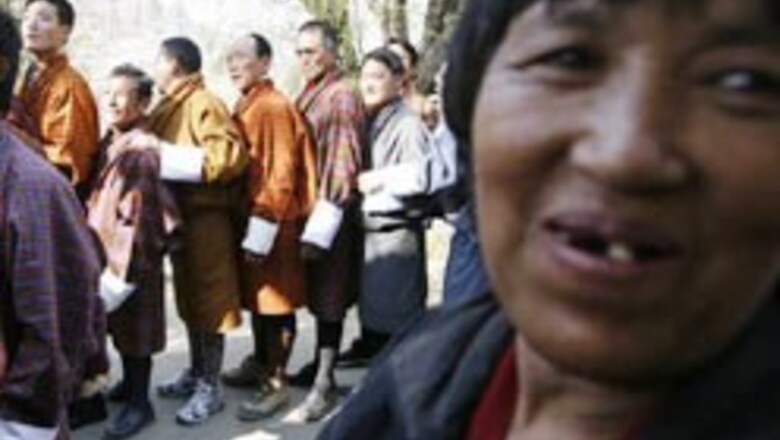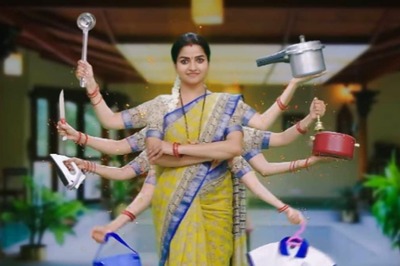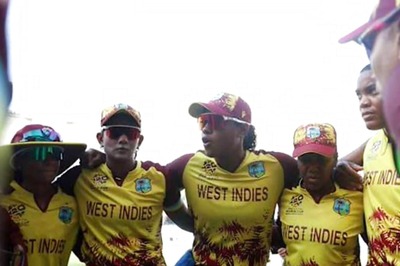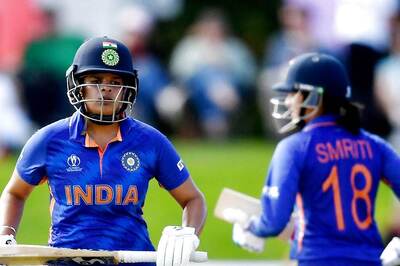
views
Thimpu: The people of Bhutan have delivered a stunning verdict in their first ever parliamentary polls, embracing democracy but overwhelmingly rejecting the king's relatives by marriage.
In the process, the mainly Buddhist Bhutanese may have found their voice after a century of royal rule in the isolated and conservative Land of the Thunder Dragon.
Landslide winner was Jigmi Thinley, a man very closely associated with the country's revered and loved kings, but who also promoted himself as a champion of ordinary people.
The present king's uncle, Sangay Ngedup, was trounced in the polls, winning just three of 47 seats. It was a verdict that seems to have amazed everyone.
"It is people speaking their minds now," said Gopilal Acharya, editor of the private Bhutan Times newspaper. By turning out in huge numbers to vote on Monday, impeccably attired in national dress, Bhutanese people showed an enthusiasm for democracy that surprised themselves.
Yet this was not a vote against the kings of Bhutan or a century of royal rule. Most people had been upset when the fourth king, Jigme Singye Wangchuck, told them he was imposing democracy before abdicating in favour of his son two years ago.
Instead, Bhutan's people voted for stability, and chose a party with plenty of experience of serving under the fourth king, and which promised to preserve the achievements of his rule.
What they firmly rejected was the notion that the king's many relatives by marriage should fill the void left by his departure from politics. "The king himself and the Wangchuck dynasty people will always love, but it was a resounding 'no' to the in-laws and what they are doing," said a businessman who watches politics closely but declined to be named for fear of trouble. "They are very unpopular."
Teacher defeats royals
Ngedup, defeated leader of the People's Democratic Party (PDP), is the brother of the fourth king's four wives, and uncle of the present king, 28-year-old Oxford-educated Jigme Khesar Namgyel Wangchuck.
PAGE_BREAK
Analysts say Ngedup had a decent record in government and, as agriculture, health and education minister, had visited many remote villages in this mountain kingdom of just 600,000 people. But his family connections were more hindrance than help.
Ngedup lost even in his own Punakha constituency—to a schoolteacher who pitched himself as a "grassroots" citizen. Ngedup's father rose from being an ordinary farmer to a massive landowner and businessman in Punakha after marrying off his four daughters to the fourth king.
Yet he is an unpopular figure, with villagers accusing him of bullying them into selling their land at knockdown rates. "Because of his father's actions, Lyonpo (minister) Sangay Ngedup has lost," said one voter. "It looks like people have been waiting for this moment, to give the government to the public."
Bhutanese are a conformist people, and under royal rule criticism of the elite had been very rare. Many people requested anonymity when talking about the elections, not daring to speak their minds openly.
Thinley, who will be Bhutan's first democratically elected prime minister, has already done the job twice under royal rule and is closely associated with the royal philosophy of gross national happiness.
That is the fourth king's idea that economic development be balanced by respect for traditions and the environment. His team included two other former prime ministers and two ex-finance ministers, and they sold themselves as people chosen and nurtured by the fourth king. This also told in his favour, with the Druk Phuensum Tshogpa (DPT) party winning 44 seats.
"People want stability," said DPT spokesman Palden Tshering. "It is all down to the experience of our party at the executive level." Yet there was another, more subtle message at work. If the king was insisting on democracy, Bhutan's people would take it. "We have always been governed by the royal family, but if he PDP had won, it would have been the same as before," said 30-year-old Tshering.
"It would not be democracy." Yet there is one aspect of the elections that is troubling many Bhutanese as the election results sink in. The world's newest democracy now has one of the world's smallest oppositions, with just three members of parliament.
"I am little bit concerned, because democracy to me means debate," said Kinley Dorji, managing director of the state-owned Kuensel newspaper. "Bhutan, at this early stage, we need this, we need that debate, we need that voice."















Comments
0 comment